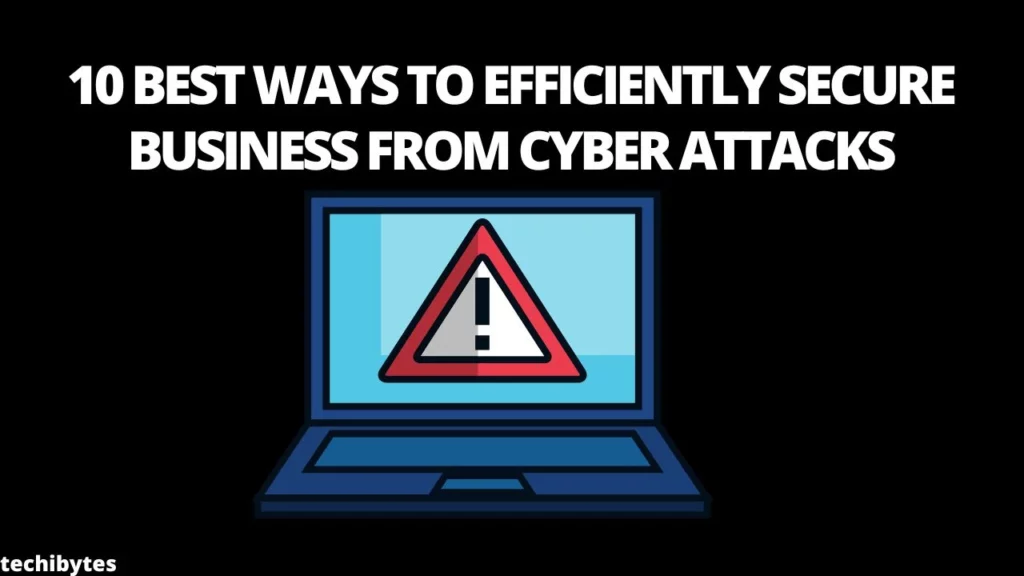46% of businesses lost some form of personally identifiable information to cyberattacks in the past year (Statista) and this negative trend only seems to be rising. One thing is clear from this statistic: it’s only a matter of time before your business is affected if you don’t do anything to secure it from cyberattacks.
There are numerous negative impacts of cyber attacks on businesses, with the effects ranging from disruption of work to loss of significant revenue. Since none of those effects are particularly positive, you should always try to be proactive at securing your enterprise from a hack.
In this article, you’ll learn 10 efficient ways to secure business from cyber attacks without a hefty cybersecurity budget. Also, I’ll show you some negative impacts of cyberattacks on businesses to show you why you should care.

What are Cyber Attacks?
According to the consensus of cybersecurity experts, a cyberattack is a malicious attempt to damage or access information on a computer or network of computers. In most cases, the entity carrying out the attack is motivated by a potential ransom if the attack becomes successful.
Cyberattacks, while immoral, can be lucrative. According to data from Cisco System, Inc., around 53% of cyberattacks resulted in damages exceeding $500,000. However, that shouldn’t suggest that revenue is the primary motive of everyone carrying out a cyberattack.
In some cases, people launch cyberattacks as a form of social justice protest, a practice that’s popularly known as hacktivism. Some hackers also launch cyberattacks mainly to prevent users from accessing specific data, not particularly for any monetary benefit.
It doesn’t matter the reason why it happened, it’s never a good thing to be the victim of a cyberattack. For one, you’ll almost certainly lose money if you’re on the receiving end of a hack. In addition to that, the following section will examine some of the other negative impacts of cyberattacks on businesses.
Negative Impacts of Cyber Attacks on Businesses
There are many different kinds of cyberattacks, and nearly none of them will have any positive impact on the victim. However, it’s easy to come up with dozens of the negative impacts of your organization being the victim of an attack.
With that said, here are some negative impacts of cyber attacks on businesses that should encourage you to invest in strengthening your network.
1. Massive loss of revenue
Loss of revenue is almost always one of the effects of a cyberattack on a business. It’s even more of a factor when the business is based online, like a social media website for example. If you’re not willing to pay thousands of dollars in ransom payment after a hack, securing your business from impending cyberattacks is absolutely necessary.
2. Disruption of day-to-day work
Depending on the scale of the attack, a hack could disrupt the employees of a business from carrying out their daily activities, especially if the business is based online. For instance, a denial of service attack can bring down a website, making it impossible to access it for any productive work.
In similar cases, bad actors could install ransomware on crucial computers in the organization, effectively preventing any productive work until a ransom is paid.
3. Hurts an organization’s reputation
If you run a business that thrives on sensitive user data, you want to ensure you keep their data safe at all times. The reputation you spent years building for your business only requires a heavily reported cyberattack to go down.
Despite the size of Facebook, the company hasn’t been able to recover from the Cambridge Analytica scandal. If you don’t want a repeat of something like that for your organization, you may want to secure your business from an impending attack efficiently.

Efficient Ways to Secure Business from Cyber Attacks
According to Verizon’s 2017 Data Breach Report, 61% of data breach victims are businesses with not more than 1,000 employees in total. In other words, micro, small, and medium enterprises make the bulk of the victims of data breaches.
That statistic should make something very clear: keeping an effective security architecture is very costly. However, it doesn’t have to be. Here are some efficient ways to secure business from cyber-attacks if you don’t have the budget of a Silicon Valley tech company.
1. Carry out regular data backups
Even if you plan to follow industry-standard business security practices, you still want to ensure you can bounce back easily in case the unexpected happens. The easiest way to bounce back is to have a backup you can restore if everything goes south. Since it’s the ultimate rescue plan, carrying out regular backups might be the best way to efficiently secure your business.
2. Enforce the use of multi-factor encryption
The traditional username and password combination is not secure enough to protect your organization from an attack by a desperate hacker. If you require an SMS verification or likewise before allowing access, there’s an infinitely better chance that you won’t suffer an attack.
:: having trouble with facebook 2-factor authentication? Read this
3. Carry out cybersecurity training for employees
Your business’s cybersecurity infrastructure is just as strong as the people manning it. If your employees don’t know basic cybersecurity tips, it’s only a matter of time before you’ll have to recover from another attack. Investing in basic cybersecurity training will certainly go a long way in securing your business from attacks.
4. Secure your organization’s hardware devices
Cybersecurity starts from ensuring the devices used within the organization are secure from any known threats. Sadly, most businesses are run off computers running outdated versions of Windows, which exposes them to cyberattacks. To prevent that, you may want to ensure the hardware devices in use within your company are secure by design.
5. Get cyber insurance
Cyber liability insurance is a kind of investment coverage that promises to cover the losses incurred during a cyberattack. The coverage typically includes coverage against data theft, hacking, data destruction, and denial of service attacks among others. While it doesn’t do much to prevent attacks, it does help to recover from one.
6. Encrypt all sensitive data
In addition to all the recommendations above, encrypting your business’s sensitive data is another tip that could help secure your business from cyberattacks. When you encrypt data, it becomes impossible to read without a key, which will make it basically useless to a hacker in the event of a hack.
7. Ban password sharing
Before using the word “ban,” I contemplated using discourage, but it sounded too soft. Your organization’s data shouldn’t have the same security priority as my Netflix login; all employees should have separate accounts and passwords for relevant software and websites.
8. Draft a cybersecurity policy
One of the most effective cybersecurity tips most businesses fail to implement is drafting a cybersecurity policy to foresee and prevent attacks on the business. The policy should include basic security tips that all employees are expected to adhere to at all times, for example, not sharing passwords and using different passwords for different sites.
If you’re not much of a cybersecurity expert, you don’t need to draft one yourself. There are tons of cybersecurity consulting firms that would be willing to help with that.
9. Keep up with the latest cybersecurity news and updates
Every day, bad actors on the internet discover new ways to compromise computers and gain unauthorized access to your business’s data. The only way to know what they’re up to and outsmart them is to keep up with the latest news and updates in cybersecurity. Bookmarking Techibytes might be an excellent way to get started.
10. Have employees get separate work devices
While a BYOD policy seems very economical on paper, it’s not very practical when cybersecurity is the ultimate goal. Letting your employees use their personal computers for work will expose your business to a cybersecurity threat if they get hacked themselves; you can solve that by procuring work devices.
FAQs
Why Should Every Small Business Care About Cyberattacks?
As I pointed out earlier, 60% of small businesses that suffer a hack will eventually close down within half a year. In short, there’s a better chance that your business will close down if you don’t start learning how to prevent cyber attacks on businesses.
Why Do Hackers Target Smaller Businesses?
Hackers choose to target smaller businesses because they tend to be less likely to be fortified against attacks. Most small companies also lack a recovery plan in the case of an attack. Going by recent cyber attacks on businesses, this trend is unlikely to change.
Conclusion
Hackers are constantly launching cyberattacks to penetrate the defenses of your business; you don’t want them to succeed. Sitting back and hoping they don’t succeed isn’t going to get you very far; you need to implement strategies proven to secure business from cyber attacks.
Unless you head a cybersecurity firm, you likely don’t know what these strategies are. This article has listed 10 of the best ways to secure business from cyber attacks efficiently and some reasons why you should care.
If you liked this article, then please subscribe to our YouTube Channel for WordPress video tutorials. You can also find us on Twitter and Facebook